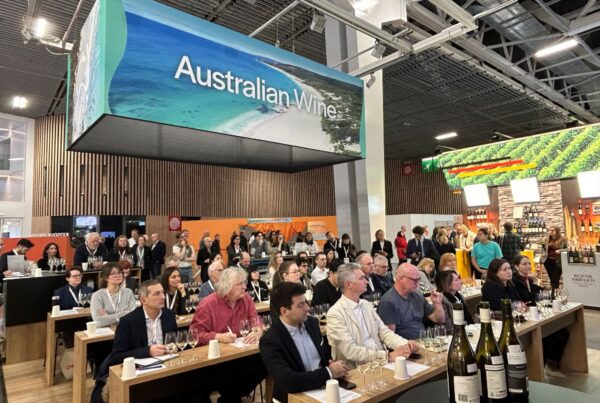
The new tariffs imposed on Australian wine imported into China will cost jobs and hurt regional communities, says Tim Ford, CEO of Treasury Wine Estates which has been hit with a 169.3 percent tariff.
“We are extremely disappointed to find our business, our partners’ businesses and the Australian wine industry in this position,” he says in an ASX statement.
“There is no doubt this will have a significant impact on many across the industry, costing jobs and hurting regional communities and economies which are the lifeblood of the wine sector.”
TWE shares have dropped 7.15 percent today to $8.56 following the trading halt on Friday.
Treasury will continue to engage with the Chinese Ministry of Commerce (MOFCOM) as the investigation proceeds “to ensure our position is understood”.
“We call for strong leadership from governments to find a pathway forward,” Mr Ford says.
He says the strength of the TWE brands, including Penfolds, combined with its diversified business model will allow TWE to implement a range of changes and plans that will enable them to manage through the significant impact of these measures.
“We will continue to work with our valued partners to further understand the implications and how we can work with the industry, governments and others to support the sector,” he says.
“At the same time, we will continue to work with our customers and partners in China to demonstrate our long-term commitment to the growing number of Chinese consumers who enjoy our brands.”
TWE expects that while the provisional measure announced remains in place, demand for its portfolio in China will be “extremely limited”.
Since the commencement of the investigation, TWE has continued to develop a detailed response plan, which will commence immediately. Benefits are likely to be limited in F21, but will progressively reach their full potential over a two to three-year period. TWE will update investors on the progress of these plans, and expected timeline, at the 1H21 financial results announcement. These initiatives aim to reduce the impact on earnings and maintain the long-term diversification and strength of TWE’s business model and brands.
TWE will reallocate Penfolds Bin and Icon range from China – which represents 25 percent of TWE’s annual global Penfolds allocation volumes – to other key luxury growth markets where there is unsatisfied demand, including Asian markets outside of China, Australia, the US and Europe.
There will be accelerated investment in sales and marketing resource and capability across these other luxury growth markets to drive incremental demand and expand the distribution footprint of Penfolds.
TWE says there will be a reallocation of luxury grape sourcing to other premium Australian portfolio brands including Wynns, Wolf Blass, Seppelt and Pepperjack, which have been “significantly supply constrained” over recent years.
The release says there will be acceleration of the “multi-country of origin portfolio growth strategy, with a focus on growing sourcing for TWE’s portfolio from its existing asset base in France and potentially from China”.
TWE will also reduce its winegrape intake from the 2021 vintage.
The company says the provisional measure announced does not include any measure relating to the previously announced countervailing investigation. Any further measures, however, are unlikely to change the plans outlined in this announcement.
Under the Chinese anti-dumping regulations, the period of application of a provisional anti-dumping measure shall not exceed four months (which would be 28 March 2021) from the date of announcement of the measure. Under special circumstances, the period may be extended to nine months (28 August 2021).
In F20 China represented approximately two-thirds of the total Asia region earnings, or 30 percent of TWE’s group earnings. TWE sells a premium portfolio in China, with luxury and masstige wine contributing 63 percent of volume and 91 percent of revenue in F20. Of the remaining portfolio, Rawson’s Retreat is the largest volume commercial brand sold by TWE in China.
TWE China’s Bin and Icon sales represent approximately 25 percent of TWE’s annual global Penfolds allocation volumes, and approximately 39 percent of TWE’s annual global Penfolds allocation revenue.
“Where this wine is reallocated to other key markets, TWE will continue to apply its globally standardised margin structure to ensure long-term brand health and price integrity,” the statement says.
“This principle ensures that sales prices and margins from luxury wine are materially consistent in all markets. To support the reallocation, TWE will retain inventory on its balance sheet, as required, for release in future periods to appropriately balance supply with demand.
In the four months to October 2020, total Asia EBITS was approximately $75 million, and within this TWE had sold approximately 30 percent of its planned F21 China Penfolds allocations to customers. In the same period, China depletions across the full TWE portfolio grew 35 percent, representing strong consumer demand.
“TWE remains comfortable with its existing inventory position and valuation,” the statement says.
“Under TWE’s flexible sourcing model, grower and bulk wine intake for the commercial and masstige portfolios can be efficiently adjusted in response to the expected changes in demand.
“TWE retains a strong, flexible and efficient capital structure that will enable it to manage through the application of these measures into the future, including the retention of inventory on its balance sheet for release in future periods.
“At 30 November2020, TWE has approximately $1.5 billion of liquidity on hand with significant headroom to the financial covenants under its borrowing arrangements.”
Photo by zhang kaiyv on Unsplash













Recent Comments